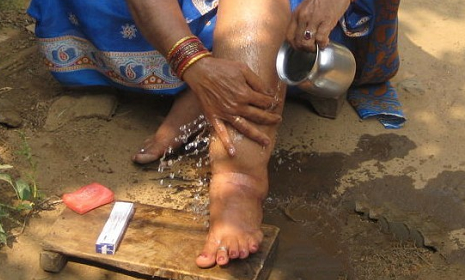A team of Indian scientists, working in collaboration with World Health Organization (WHO), finds single drug treatment for Lymphatic Filariasis, commonly known as Elephentiasis is as effective as combination drug treatment. Lymphatic Filariasis, a parasitic disease continues to be a public health problem in parts of India.
New Delhi (ISW) – Lymphatic filariasis (LF), a parasitic disease commonly known as elephantiasis, continues to be a public health problem in parts of India.
For several years, preventive chemotherapy in the form of Mass Drug Administration of a drug called diethylcarbamazine (DEC) is being used in endemic areas. A new study has found that addition of another drug, albendazole (ABZ), does not offer any advantage. This is significant as safety of medicines administered on an ongoing, long-term basis as a preventive measure is always a matter of concern.
A team of Indian scientists, working with collaborators from the World Health Organization (WHO), evaluated the efficacy, tolerability, and safety of ABZ and DEC used for mass drug administration for populations susceptible to Lymphatic Filariasis which is caused by roundworms. Mosquitoes carrying the infectious roundworm transmit it and affect people.
The team led by Dr. Nilima A Kshirsagar of Seth GS Medical College and KEM Hospital, Mumbai compared the efficacy and safety of a 3-year treatment programme of a single annual dose of DEC and ABZ with a single annual dose of DEC in people from two villages, Kurzadi and Selukate in Wardha, Maharashtra. They have found the treatment was safe and that there was no difference between the two prevention protocols.
Researchers have been studying the safety and efficacy of the drugs since the launch of the Global Program to Eliminate Lymphatic Filariasis in 2000 to limit disease transmission by reducing microfilaria (or immature larvae) using drugs. Immature larvae are responsible for transmission while adult worm results in disease.
Using standard assays, they confirmed a decline in microfilaria positivity in people. The study also showed both the combination and DEC were well tolerated although supplementation of DEC with ABZ did not show any advantage over only DEC. “The study findings are important for monitoring and evaluation of the LF elimination programme,” explained the researchers.
However, other experts have a word of caution. “The interpretation with regard to beneficial effects of ABZ and DEC when given alone compared to when given in combination remains inconclusive and may require proof of principal by carrying out similar studies on larger cohort size,” felt Dr. Naresh Arora, Project Scientist, DBT-Centre of Excellence, Jamia Hamdard University, who is not connected with the study.
The results of the study have appeared in journal Parasitology Research.


